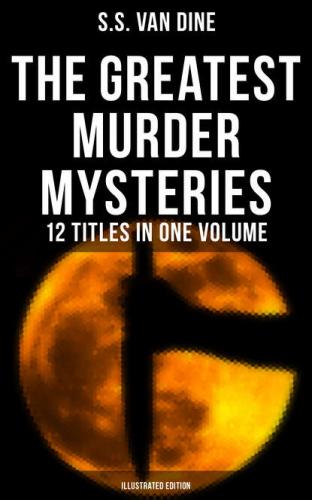“It represented practically every cent I had in the world.”
“Astonishin’! . . . And would you mind if I asked you why you selected the label of Beethoven’s Andante for your record?”
“Another miscalculation,” the man said wearily. “It occurred to me that if any one should, by any chance, open the phonograph before I could return and destroy the record, he wouldn’t be as likely to want to hear the classics as he would a more popular selection.”
“And one who detests popular music had to find it! I fear, Mr. Spotswoode, that an unkind fate sat in at your game.”
“Yes. . . . If I were religiously inclined, I might talk poppycock about retribution and divine punishment.”
“I’d like to ask you about the jewellery,” said Markham. “It’s not sportsmanlike to do it, and I wouldn’t suggest it, except that you’ve already confessed voluntarily to the main points at issue.”
“I shall take no offense at any question you desire to ask, sir,” Spotswoode answered. “After I had recovered my letters from the document-box, I turned the rooms upside down to give the impression of a burglary—being careful to use gloves, of course. And I took the woman’s jewellery for the same reason. Parenthetically, I had paid for most of it. I offered it as a sop to Skeel, but he was afraid to accept it; and finally I decided to rid myself of it. I wrapped it in one of the club newspapers and threw it in a waste-bin near the Flatiron Building.”
“You wrapped it in the morning Herald,” put in Heath. “Did you know that Pop Cleaver reads nothing but the Herald?”
“Sergeant!” Vance’s voice was a cutting reprimand. “Certainly Mr. Spotswoode was not aware of that fact—else he would not have selected the Herald.”
Spotswoode smiled at Heath with pitying contempt. Then, with an appreciative glance at Vance, he turned back to Markham.
“An hour or so after I had disposed of the jewels I was assailed by the fear that the package might be found and the paper traced. So I bought another Herald and put it on the rack.” He paused. “Is that all?”
Markham nodded.
“Thank you—that’s all; except that I must now ask you to go with these officers.”
“In that case,” said Spotswoode quietly, “there’s a small favor I have to ask of you, Mr. Markham. Now that the blow has fallen, I wish to write a certain note—to my wife. But I want to be alone when I write it. Surely you understand that desire. It will take but a few moments. Your men may stand at the door—I can’t very well escape. . . . The victor can afford to be generous to that extent.”
Before Markham had time to reply, Vance stepped forward and touched his arm.
“I trust,” he interposed, “that you won’t deem it necess’ry to refuse Mr. Spotswoode’s request.”
Markham looked at him hesitantly.
“I guess you’ve pretty well earned the right to dictate, Vance,” he acquiesced.
Then he ordered Heath and Snitkin to wait outside in the hall, and he and Vance and I went into the adjoining room. Markham stood, as if on guard, near the door; but Vance, with an ironical smile, sauntered to the window and gazed out into Madison Square.
“My word, Markham!” he declared. “There’s something rather colossal about that chap. Y’ know, one can’t help admiring him. He’s so eminently sane and logical.”
Markham made no response. The drone of the city’s mid-afternoon noises, muffled by the closed windows, seemed to intensify the ominous silence of the little bedchamber where we waited.
Then came a sharp report from the other room.
Markham flung open the door. Heath and Snitkin were already rushing toward Spotswoode’s prostrate body, and were bending over it when Markham entered. Immediately he wheeled about and glared at Vance, who now appeared in the doorway.
“He’s shot himself!”
“Fancy that,” said Vance.
“You—you knew he was going to do that?” Markham spluttered.
“It was rather obvious, don’t y’ know.”
Markham’s eyes flashed angrily.
“And you deliberately interceded for him—to give him the opportunity?”
“Tut, tut, my dear fellow!” Vance reproached him. “Pray don’t give way to conventional moral indignation. However unethical—theoretically—it may be to take another’s life, a man’s own life is certainly his to do with as he chooses. Suicide is his inalienable right. And under the paternal tyranny of our modern democracy, I’m rather inclined to think it’s about the only right he has left, what?”
He glanced at his watch and frowned.
“D’ ye know, I’ve missed my concert, bothering with your beastly affairs,” he complained amiably, giving Markham an engaging smile; “and now you’re actually scolding me. ’Pon my word, old fellow, you’re deuced ungrateful!”
THE GREENE MURDER CASE
Murder most foul, as in the best it is;
But this most foul, strange and unnatural.
—Hamlet.
TO
NORBERT L. LEDERER
Αγαθὴ δὲ παράφασίς ἐστιν ἐταίρου
CHAPTER II. THE INVESTIGATION OPENS
CHAPTER III. AT THE GREENE MANSION
CHAPTER IV. THE MISSING REVOLVER
CHAPTER V. HOMICIDAL POSSIBILITIES
CHAPTER VII. VANCE ARGUES THE CASE
CHAPTER VIII. THE SECOND TRAGEDY
CHAPTER X. THE CLOSING OF A DOOR
CHAPTER XI. A PAINFUL INTERVIEW
